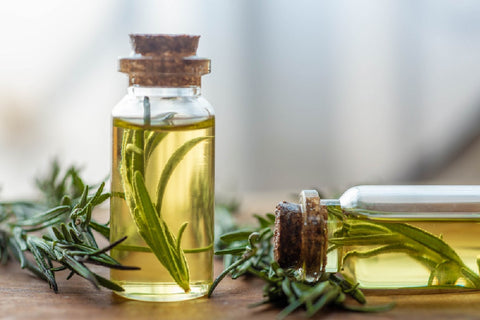Rosemary oil is a natural and aromatic essential oil that has gained popularity for its potential benefits in hair care, particularly for individuals with low porosity hair. Low porosity hair tends to have a tightly sealed cuticle layer, making it challenging for moisture and products to penetrate.

Rosemary oil is believed to offer a solution due to its ability to stimulate the scalp, improve blood circulation, and promote hair growth. Additionally, its lightweight nature makes it suitable for low porosity hair, as it doesn't weigh down the strands. This article will delve into the advantages and best practices of using rosemary oil for low porosity hair care.
Is Rosemary Essential Oil Good For Low Porosity Hair?
Rosemary oil is believed to be beneficial due to its potential to stimulate the scalp, improve circulation, and promote hair growth.
Rosemary essential oil is a popular choice for low porosity hair care. Low porosity hair has a tightly sealed cuticle layer, making moisture retention a challenge.
Rosemary Oil Benefits For Low Porosity Hair
Rosemary oil is ideal for low porosity hair and is known for its resistance to moisture and styling due to its tight cuticle structure. As you read on, you’ll come across the specific advantages of using rosemary essential oil to care for low porosity hair.
- Improved Scalp Health: Rosemary oil has antifungal and antibacterial properties that can help maintain a healthy scalp environment. It prevents dandruff, itchiness, and flakiness, promoting an ideal foundation for hair growth. By reducing scalp issues, rosemary oil ensures that low porosity hair has the best environment to thrive.
- Enhanced Moisture Retention: Low porosity hair struggles to absorb moisture, but rosemary oil's lightweight and penetrative nature allows it to hydrate hair without weighing it down. This helps prevent dryness, brittleness, and breakage often associated with low porosity hair.

- Stimulated Hair Growth: Rosemary oil contains compounds like ursolic acid and rosmarinic acid that stimulate hair follicles, promoting new hair growth. This is particularly valuable for those with low porosity hair, as it encourages thicker and denser hair strands.
- Increased Hair Elasticity: Low porosity hair can be rigid and prone to breakage. Rosemary oil strengthens hair by improving elasticity, making it more resilient to damage from styling and environmental factors.
- Enhanced Hair Texture: Regular use of rosemary oil can lead to smoother and shinier low porosity hair. It helps to smoothen the hair cuticle, making it more receptive to other hair care products and leaving the hair looking healthier and more lustrous overall.
How To Use Rosemary Oil For Low Porosity Hair?
Using rosemary oil for low porosity hair can be a game-changer in your hair care routine. Its ability to improve moisture retention and promote hair health makes it a valuable asset. Below, we'll outline how to effectively use rosemary oil for low porosity hair, ensuring maximum benefits.

Ingredients:
- Rosemary Essential Oil - 3 Drops
- Golden Jojoba Oil - 1 Tablespoon
Directions:
Dilution: Mix 3-5 drops of rosemary oil with a tablespoon of carrier oil, adjusting for hair length and thickness.
Patch Test: Before application, perform a patch test to check for allergies or irritation.
Preparation: Cleanse hair with a sulfate-free shampoo to remove buildup.
Application: Section hair and apply the rosemary oil blend to your scalp, massaging gently. Use a wide-toothed comb to distribute through hair strands.
Treatment: Cover hair with a cap or towel and leave on for at least 30 minutes, then rinse, shampoo, condition, and adjust the frequency for your hair's needs.
Frequently Asked Questions
Here are some frequently asked questions (FAQs) to provide you with comprehensive insights into using rosemary oil for low porosity hair. These answers will help you navigate the world of low porosity hair care with rosemary oil effectively.

Q: Does Rosemary Oil Work For Low Porosity Hair?
Ans: Yes, rosemary oil can be effective for low porosity hair. Its ability to stimulate the scalp, improve circulation, and enhance moisture retention can address the challenges faced by low porosity hair.
Regular use of rosemary oil can promote healthier and more manageable low porosity hair, but individual results may vary. It's essential to use it as part of a consistent hair care routine for best results.
Q: Is Rosemary Oil OK for Low Porosity Hair?
Ans: Yes, rosemary oil is generally suitable for low porosity hair. It can help improve scalp health, increase moisture retention, and promote overall hair health. Always perform a patch test to ensure you don't have any adverse reactions before applying it to your scalp.
However, it's essential to use it in moderation and dilute it with carrier oil to prevent any potential scalp irritation. Additionally, individual hair types may respond differently, so monitor how your hair reacts and adjust your usage accordingly.
Conclusion
Are you ready to take your hair to the next level? Incorporating Veda Oils' high-quality rosemary essential oil into your low porosity hair care routine can yield numerous benefits.
It addresses the unique challenges of low porosity hair by enhancing scalp health, improving moisture retention, stimulating hair growth, and promoting overall hair texture. Elevate your hair care game with the natural and aromatic power of rosemary oil.













 Sign in
Sign in Register now
Register now My Reward Points
My Reward Points








